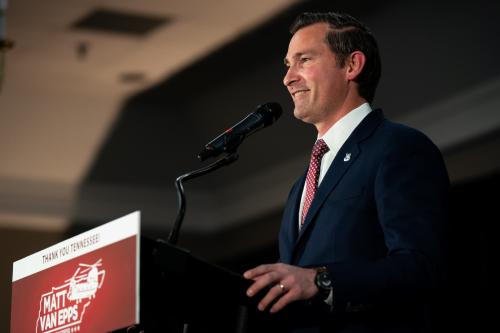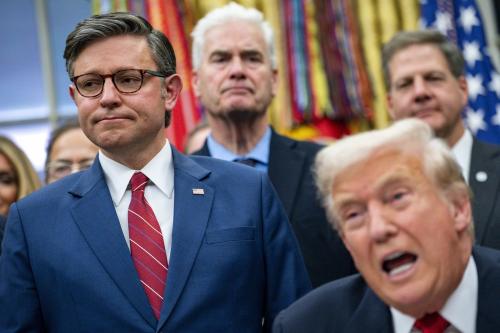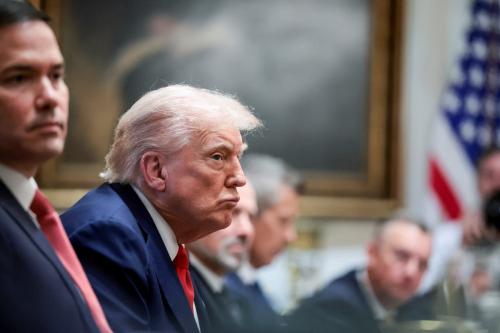Just when you thought you might get a break from the tiresome politicking about oil prices in this election year, here come the presidential candidates again sparring over the high cost of fuel and proposing dubious remedies.
Round one came last June, when the average cost of regular gasoline rose to $1.68 per gallon. Vice President Al Gore morphed from “New Democrat” into the old populist variety that throughout the 1970s ritually imputed higher energy costs to an “industry-backed ripoff.” Never mind that $1.68-a-gallon gas in the United States is a steal compared to the average price in virtually every other industrialized country, or that adjusting for inflation, Americans this summer paid 38 percent less for a gallon of fuel than they had 19 years ago. Gore called for a “thorough and hard-hitting” investigation of what he suspected was “big oil’s price gouging.” Playing it safe, Gov. George W. Bush concurred that wasting taxpayers’ money on the umpteenth federal inquest of this sort in the past quarter-century was “fair” and “healthy.” To parry Republican charges that he had “no energy policy” for the long term, Gore prescribed more subsidies and tax incentives for businesses and consumers. Bush sounded scornful of these ideas, but traditionally the GOP’s notion of an energy policy also has included abundant subventions and tax breaks, especially for producers.
Now comes round two. “I’m not satisfied when filling up your gas tank feels like a major purchase,” Gore declaimed the other day. “I am going to stand up to big oil and demand fairer gasoline prices.” His latest suggestion: Tap the U.S. Strategic Petroleum Reserve (a stockpile intended for use in grave emergencies).
Last Friday, President Bill Clinton approved the concept. A million barrels a day will be drawn from the reserve over 30 days.
Whether this maneuver will stabilize prices, or just tweak them temporarily, is a good question. An even better question is why government should be back in the business of deciding the “fair” price of energy in the first place.
Bush seems of two minds on this matter. He views Gore’s machinations as “bad public policy.” But in the next breath, Bush suggests an assertive role for government: It should intervene, he insists, to “aggressively expand” domestic oil drilling.
But what is the point of aggressively promoting oil exploration in places like the Arctic National Wildlife Refuge if not, presumably, to boost output and hence keep prices “affordable” for consumers? Maybe blaming the current so-called energy crisis either on big oil’s “unfair profiteering” or on the schemes of wildlife conservationists—and concocting solutions featuring tax preferences and special concessions for politically pivotal clienteles—is what it inevitably takes to get elected.
Nevertheless, the tendency of politicians, in both parties, to promise the public a free lunch is distasteful.
Nobody enjoys paying more for things, whether the product is gasoline or fast food, but most grown-ups also suspect that ultimately they cannot have it both ways (stuffing down cheeseburgers, say, without running up doctors’ bills).
Most of us know that governments, like households, have to make choices. An energy policy that spends time and resources investigating, “incentivizing” and otherwise manipulating the marketplace—chiefly to enshrine a national entitlement to “fair” (meaning cheap) fuel—is not congruent with other pledges our political leaders have made: to advance alternate fuels, lessen dependence on imported oil and improve the energy-efficiency of automobiles, buildings and appliances. Nor is such a policy consistent with the goals of reducing congestion, air pollution and urban sprawl.
Take sprawl. At least one of the presidential candidates, Gore, has raised the issue. Multiple forces create all those new suburban subdivisions, shopping malls, parking lots and freeways that litter our landscape. Not least among the causes, however, is bargain-basement energy.
To see why, think about how European cities remain relatively compact compared to America’s sprawling metropolitan areas. Like it or not, part of the difference surely has to do with the bottom line for gasoline, which is more than twice as expensive in most of Europe as in the United States. Not surprisingly, most European families and firms locate closer to city centers, where it is possible to walk to work or take public transit.
The going rate for electricity and heating fuel (natural gas, for instance) is also steeper in Europe. The expense of heating or air-conditioning the equivalent of an average detached U.S. suburban house, and of operating the huge home appliances it typically accommodates, would be daunting to most European households. No wonder so many inhabit smaller dwelling units, such as in-town apartments.
Whether Americans ought to live as the Europeans do is, of course, a highly debatable matter. (Motorists throughout Europe are finally fed up with paying the equivalent of $4 to $5 a gallon at the pump.) What is not open to much dispute, though, is the way our comparatively inexpensive energy abets a dispersed, sometimes rapacious, form of urban growth. And if this “sprawl” is deemed a problem, then logically, so is underpriced energy.
The larger lesson here is this: In public policy, as in life, trade-offs exist. Bold political leadership would acknowledge, not obfuscate, that simple fact.
The Brookings Institution is committed to quality, independence, and impact.
We are supported by a diverse array of funders. In line with our values and policies, each Brookings publication represents the sole views of its author(s).



Commentary
Op-edU.S. Gas-Pump Policy Is Full of Hot Air
September 26, 2000